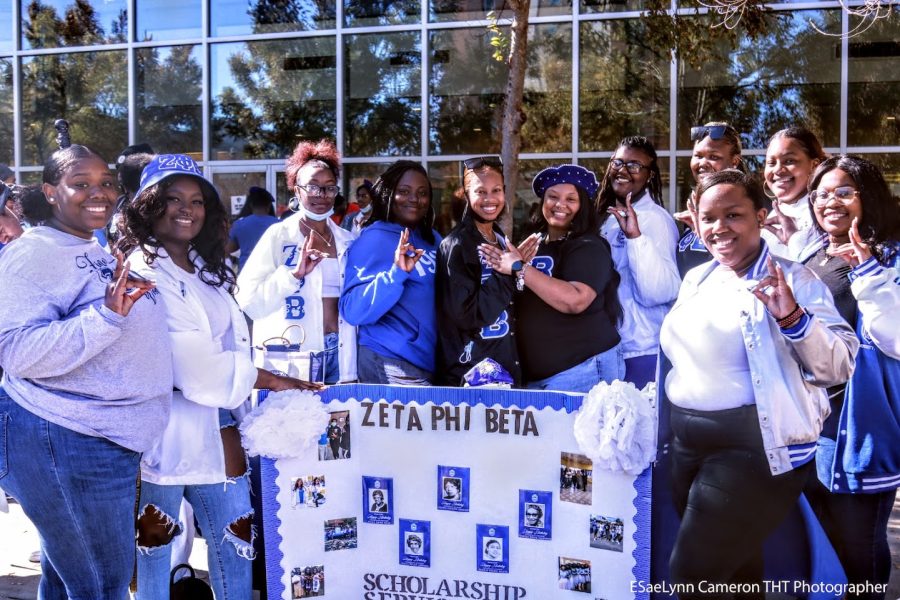Column: Are Greek Organizations showcasing leadership on campus?
November 20, 2021
Primarily known for networking, scholarship, fellowship and community involvement, Divine Nine fraternities and sororities or Black Greek Letter Organizations (BLGOs) are meant to showcase a special class of leadership. The question that is often asked by many students, as well as myself, “Is that leadership being demonstrated on the campus of Alabama State University.”
When students are asked to pinpoint examples of Greek leadership on the campus, the answer is, more often than not, utter silence.
Currently, there are eight active Greek organizations on campus, including Alpha Phi Alpha Fraternity, Inc., Alpha Kappa Alpha Sorority, Inc., Omega Psi Phi Fraternity, Inc., Delta Sigma Theta Sorority, Inc., Phi Beta Sigma Fraternity, Inc., Zeta Phi Beta Sorority, Inc., Sigma Gamma Rho Sorority, Inc., and Iota Phi Theta Fraternity, Inc.
Each of these organizations have national initiatives that they must complete each year, so many of the things that Greek organizations contribute to the community are conducted off-campus to fulfill their community involvement. So for one to say that they are not doing anything would be false because they are mandated to do certain things throughout the year.
However, one could ask with all sincerity, what quality programs are they sponsoring for students who live on campus and students who live off-campus? What kind of leadership programs are they providing?
After each new wave of members is fully initiated into their organization, people often mention the various Instagram posts Greek orgs make in front of their stones, the large social appearances in the cafeteria during ‘Fried Chicken Wednesday,’ and their vibrant strolling during a mixer or party. Is this considered leadership or just attractive attributions to garner new members?
If the strolling, stepping and stomping were equalized by voter education programs, leadership development programs, mentoring programs, and tutorial programs, I would have nothing to say because students would be able to visualize both sides – the entertainment side and the authentic side. Unfortunately, students at Alabama State University are only seeing the entertainment side. If more emphasis were placed on the authentic side, fraternities and sororities would see more students with better grade-point averages attracted to their organizations.
If one looks at the origin of Greek life, he or she would see that Greek life began in the 1700s, with Phi Beta Kappa officially known as the first fraternity. Phi Beta Kappa was founded at the College of William and Mary, and by the 19th century, fraternities expanded throughout the United States. Sororities got their start in the mid-1800s with Gamma Phi Beta, founded at Syracuse University in 1874.
While these Greek organizations became a safe haven for Caucasian students and allowed them to have a voice and a shared identity, African Americans did not have the same opportunities.
BGLOs began to come into fruition in the early 20th century due to the trials and tribulations that many African Americans were facing within the United States at the time. The inclusion of African Americans in universities proved to be trying times for African American students in the early 1900s. Often ostracized and banned from joining many social organizations, African American students began searching for ways to cope with these struggles.
The nine historically Black Greek Letter Organizations that are affectionately referred to as the Divine Nine make up the National Pan-Hellenic Council (NPHC). The NPHC was founded in 1930 at Howard University to support African American college students who were searching for a voice, community, and shared identity as they pursued their education.
Each organization holds a historical significance to HBCUs, with several of its members contributing to notable change.
The “Alphas” have a strong lineage of leaders who fought for civil rights and social justice through segregation, apartheid, the AIDS crisis, and multiple wars. Civil rights leaders like Martin Luther King, Jr. and W.E.B. Du Bois were proud members of the fraternity.
The “Deltas” also implemented and fought for numerous changes, specifically for Black women. Delta Sigma Theta Sorority, Inc. participated in the Women’s Suffrage March on March 3, 1913, and is currently a member of the National Association for the Advancement of Colored People (NAACP) and the National Council of Negro Women (NCNW). The sorority is also involved in several charitable initiatives, including the Go Red For Women Campaign and World Aids Day. One of their most notable members is Shirley Chisholm, the first Black woman elected to the United States Congress.
Founded on manhood, scholarship, perseverance, and uplift as their cardinal principles, the “Ques” take the reins as the first Black fraternity at an HBCU and are famous for their involvement in various job fields, including business, politics, the arts, etc. Michael Jordan, Rev. Jesse Jackson and President Quinton T. Ross, Jr., Ed.D., are just three of their most notable members.
With the colors of salmon pink and apple green and a leaf representing the organization, the “AKAs” are considered the oldest original member of NPHC Greek organizations. The AKAs have several notable members who are phenomenal leaders in their respective fields, with the most notable being Vice President Kamala Harris. The sorority has expanded outside of the United States and now has become a vital part of college life in Japan, Germany and the Virgin Islands.
Iota Phi Theta Fraternity, Inc. was founded in 1963 at Morgan State University during the height of the Civil Rights Movement. The 12 men who started this fraternity were nontraditional students influenced by civil rights leaders like Malcolm X and the Black Panthers. Iota Phi Theta Fraternity, Inc. became heavily involved in social causes, activism, and service, including the boycott of a segregated shopping mall in Baltimore, Maryland. Congressman Bobby Rush and Terrence T.C. Carson were both members of Iota Phi Theta Fraternity, Inc., and today more than 30,000 college students are a part of the fraternity’s chapters.
Only referencing five out of the Divine Nine, one can see the many accomplishments, accolades, and leadership qualities that come with being a member of these organizations.
From what I have seen and heard, many of those qualities are lackluster.
No one should join a Black fraternity or sorority just because of their attractive jackets and t-shirts or their thriving popularity, but they should want to join with the willing heart and mind to create change in their community.
This is not a bashing session but a learning experience from which we as a culture can grow.
We do not need the next Martin Luther King, Malcolm X or Rosa Parks, as no one can replicate them. However, we do need the next generation of powerful Black leaders who will guide our community into positivity and light. I believe if we can alter the culture of our Divine Nine at ASU, we can provide that necessary leadership.
Make the next generation, and the generation after, be proud to be a part of such a historical tradition.








